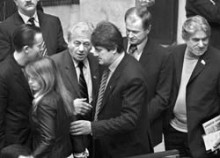Old predictions have come true. The biggest — until last week — and seemingly unbreakable mega-faction Our Ukraine has suffered its first losses. A group of 19 lawmakers of the Ukrainian People’s Party (UPP) has approved a decision to withdraw from Our Ukraine and create its own faction, which happened against the backdrop of the formation of a new government party, the People’s Union “Our Ukraine.” Yuriy Kostenko, the group’s leader, explained this manifestation of political independence by the fact that the UPP charter makes it impossible for its members to belong to a faction of a different party. He also said that the UPP has already formed separate factions in the Kharkiv and Rivne oblast assemblies, and plans to do so in Lviv, Ternopil, and Ivano- Frankivsk oblasts. However, the UPP will not be in opposition to the presidential faction, obviously so as to leave room for maneuvers ahead of the parliamentary elections. According to Kostenko, who is a longtime opponent of artificial government parties created by way of voluntary dissolution of constituent parties, the newly-formed UPP will maintain “a partner relationship” with Our Ukraine and support President Viktor Yushchenko. Meanwhile, explaining the reasons for the withdrawal, another UPP leader Valery Asadchev said that the People’s Union “Our Ukraine” was “created in the wrong way, from the top down,” and pointed to the ideological aspect. According to him, it is difficult to understand the ideology of Our Ukraine, while the UPP maintains clear national democratic positions.
Whatever the reasons for Kostenko’s reluctance to join the single party — ideological differences, political grudges, or personal ambitions — it is obvious that the new government party may share the fate of another former mega-faction, For a United Ukraine. The first troubling signals indicating this have already appeared. The Day approached its experts to comment on these signals.
Viktor NEBOZHENKO, political scientist:
“The withdrawal of Kostenko’s group from Our Ukraine has two political implications. First, it is very important for the Ukrainian political spectrum to become structured, with some groups adopting openly rightist positions and others maintaining a more centrist and populist platform. In this respect, I believe that Kostenko and his followers are absolutely right, since they want to uphold more profoundly national democratic positions. Moreover, right now the newly-formed government party cannot afford to show a clear political orientation and will have to position itself as a centrist political force. This is bound to create problems for independent groups within it. Therefore, in this sense such party diversification is normal.
“Second, those who are now declaring their intention to withdraw from Our Ukraine (I emphasize the word intention, since all these declarations might be merely elements of political bargaining) understand perfectly well that there is not enough room for them on the Noah’s Ark called the People’s Union “Our Ukraine,” which is flying Yushchenko’s colors. They sense that this huge political Titanic cannot hold everybody. On the one hand, they realize that after coming onboard they will have a chance to get to the oceanic shore called Elections 2006. On the other hand, they understand that they will not gain any benefits once they are there. It is therefore obvious that Kostenko’s group is trying to build its own small ship and follow its own course.”
Volodymyr POLOKHALO, editor of the Political Thought magazine:
“I wouldn’t call UPP’s withdrawal from Our Ukraine a demarche by Kostenko. After all, there has been no break with the key political figure, Viktor Yushchenko. On the contrary, Yury Kostenko has always declared his support for the president. Therefore, it was not a demarche, but rather a positioning maneuver based on rational calculations before the 2006 elections. In this sense, it is a normal, civilized, and politically justified move.
“On the other hand, politics always involve bargaining. In the current situation it is symptomatic that so far there is no strategic consensus among the political forces that have rallied around Viktor Yushchenko. In this case we are seeing signs of the old political culture, corporate partisan ethics, and old forms of political rivalry and struggle. And this is not merely a struggle of ambitions or grudges among people who stood by Yushchenko during the Orange Revolution. This is primarily a sign of an unfledged political culture of dialog and compromise. Obviously, in the party-building process Yushchenko is betting on force, pressure, and his financial or informational resources, creating a kind of aristocratic club in which there are lords, barons, and hereditary aristocrats as opposed to potential political outcasts. I consider it a strategic mistake on the part of the team forming the new party, People’s Union “Our Ukraine,” and we have already seen the initial results.”







